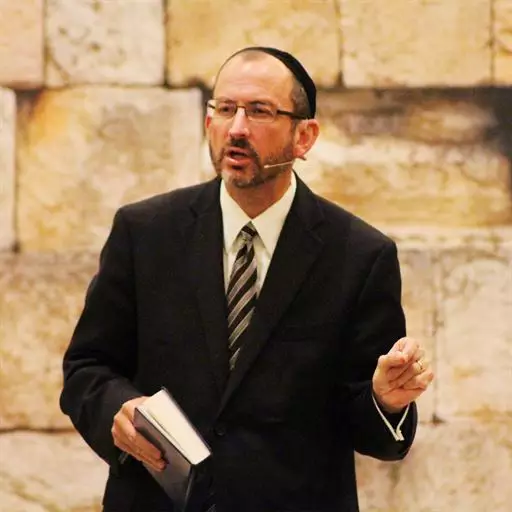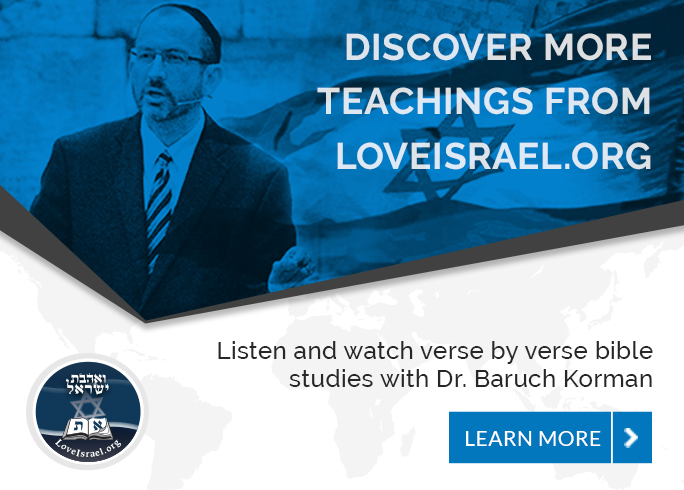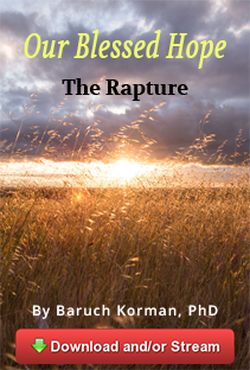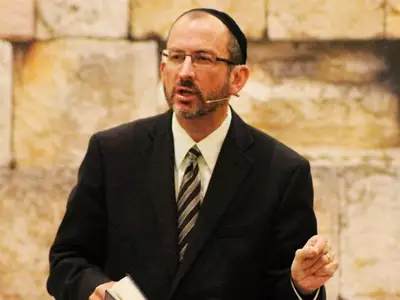Speaker 1
Shalom and welcome to Via Hafta Yisrael, a Hebrew phrase which means you shall love Israel. We hope you'll stay with us for the next 30 minutes as our teacher, Dr. Baruch, shares his expository teaching from the Bible.
Dr. Baruch is the senior lecturer at the Zarah Avraham Institute, based in Israel. Although all courses are taught in Hebrew at the institute, Dr. Baruch is pleased to share this weekly address in English.
To find out more about our work in Israel, please visit us on the web at loveisrael.org—that's one word, loveisrael.org.
Now here's Baruch with today's lesson.
Speaker 2
I like to begin like I did last week by reminding us that everything that happens in the Scripture happens for a reason. Nothing is by chance. Everything is by the providence of God. Now Messiah told his disciples, watch and pray that you do not fall into temptation, meaning that you do not let the opposition of the world change you into doing that which is against the plans and the purposes of God.
Now, in another gospel, what did Peter say? Peter said very boldly, but very incorrectly, you know, the others might deny you, but not me, I am ready to die with you. Now, those were very bold words, but were they accurate? And the answer is going to be no. And that's why Messiah is going to tell Peter that before the rooster crows three times, you will deny me.
Now, how did Yeshua, and I'm speaking about Jesus of Nazareth, how did he know this? Very simply, he knows all things. Why? Because he is Emmanuel, meaning God with us. And everything that Messiah did, he either did it being the Son of God or the Son of Man. And what do I mean by that? When the Scripture emphasizes that he is the Son of Man, what he does and what he says is for an example for us, to teach us how we should think, how we should speak, and of course, how we should behave.
But when the Scripture speaks about him being the Son of God, we see that he is that faithful servant to His Father that accomplishes His Father's will and brings glory to his Heavenly Father. Now, we are just human beings, but through the anointing of the Holy Spirit, we too can carry out those same things, bringing honor and glory by faithfully serving God. And we want to do that today, we want to do that tomorrow, and we want to continue to serve him faithfully until that glorious day known as the Rapture.
Well, with that said, take out your Bible and look with me to Luke's gospel, chapter 22. And now we're ready for verse 47. Luke's gospel, chapter 22. And we're going to begin in verse 47. Now, here we see that Messiah had been speaking to the disciples about not succumbing to temptation. And what happens? Well, look with me to our first verse, verse 47, what it says, but while still speaking. Behold, a crowd.
Now, who is this crowd? This crowd consists of the captains of the temple. We'll talk more about them. But this was a group of people who served the Jewish leadership: the high priests, the priests and the Levites, the Pharisees, the Sadducees, those who were part of the Sanhedrin. They served from Rome. They served the Jewish leadership. They came with others for one purpose. And what was that? Well, it shouldn't surprise us. We left off last week with Messiah and his disciples being where? In the Garden of Gethsemane. And therefore they came to arrest him.
So look carefully. It says, while he was still speaking. Who's that? Yeshua. Behold, a crowd. And not just a crowd, but notice who is singled out. Also the one being called Judas, one of the twelfth. And he went before them, meaning he was leading. And he drew near to Yeshua to kiss him. Now we know that that kiss was a symbol. It was a sign that he gave the leadership. And I'm speaking about the Jewish leadership and those from the Roman Empire that went with the leadership in order to arrest him.
And what we see here was the sign of who the Messiah is, was a kiss that Judas. And we'll see this in a moment, Judas was betraying him with this false sign of affection. Look now to verse 48. But Yeshua said to him, yehuda, meaning Judas, with a kiss, you are betraying the Son of Man. Now, why is he called the Son of Man? Here, very simply, he is serving humanity by laying down his life. What does the Scripture say? No one took his life, but he freely laid it down. What is that? Emphasizing his submissiveness.
And we saw this last week when obviously no one would want to be crucified. No one would want to be abused and beaten and flogged as he was. But yet he submitted to that. Why? Because he was a faithful servant. He served his Father, obviously His heavenly Father. But what he did, he did for you and me. And not just you and me, but all of humanity. That is why he's called the Son of Man. The servant of humanity.
So we see that Messiah says, with a kiss, you are betraying the Son of Man. Look now to verse 49. But the ones, and these ones had to do with the disciples who were with him and also perhaps others who came to arrest him. It says here, but those seen concerning him, the ones who. And it literally says the ones who were being there. And the implication is they were made to be there, they were on assignment. And who was leading them? Judas was.
So we see this group that came to arrest him and the disciples were there. They were all witnessing it being there. And he said to him, lord. Now what we find is that there was this group who said to the Lord, and this is probably the disciples who are speaking in this case. They said to him, lord, if we should strike with the sword. Meaning is this why you mentioned earlier that we should purchase a sword for this moment and notice what happens? Look now to verse 50.
And a certain one we know from another gospel, it's Peter. So a certain one from them, meaning from the disciples, struck. Struck the servant of the high priests. Now again, all of this is providential. Why? Well, Peter, apparently he just took a sword and struck. And by the providence of God, it was the servant of the high priest. Why is that so important? Because the high priest is going to be over this trial. And can you imagine this? This servant came and said, this is the one. But I need to tell you something. My ear was cut off by one of his disciples.
And what did he do? Well, the scripture tells us we don't have to guess or speculate. What does the scripture say? Well, this servant of the high priest, he had his right ear, notice the word cut off. So his ear was cut off by the other Gospel tells us, by Peter. And what happens? Look at verse 51. But Yeshua said permit until this, meaning this. As far as it goes, the only resistance is going to be that act.
Now why this is being emphasized in the text. And there's a reason for it. And the reason is very simple. This high priest was going to bear witness. That would be the assumption that he would go back and said what had happened, that his ear was cut off. And what happens? Messiah? And we'll see this in a moment. The scripture is going to tell us that Messiah touched his ear. And notice what, what the scripture says, end of a verse 51, where it says permit until this, meaning no more than this.
And here's what the scripture says. And he being touched, meaning Yeshua touched his ear. And when that ear was touched, what happens? And it's a place where the ear was. The scripture is very clear. And he healed him. Now that is not simply saying that the wound was closed, but the word here for healing represents a restoration. So what happened? The ear was cut off. Now, the scripture does not say that Yeshua bent down and picked it up and put it back. That's not what happened.
What we see here is Yeshua simply touched that spot where the ear was, and that ear was restored. Meaning that through the touch of Yeshua's hand, being the Son of God, that ear was restored. It reappeared, not the one on the ground, but a new ear. Why? This is what Messiah is going to do. He is going to cause all things to be new. That is a kingdom work. When you look at the book of Revelation and chapter 22, we're going to see, behold, all things are new.
When John, who wrote the book of Revelation, saw the new Jerusalem, this is what he was compelled to say. Behold, all things are new. And that word new is a kingdom word which refers to a kingdom restoration. And that's what this servant experienced. Look now to verse 52. But Yeshua said to the ones having arrived against him. Now notice this is very important that you see those who came there, they were, according to the scripture, against him.
And who were these ones who had arrived there, been brought there? Well, they were the high priests and the captains of the temple, this guard of leadership that the Romans supplied, the Jewish leadership and also the elders. Now they all arrived there, but Yeshua was speaking. And what did he say? As against a thief, you come out with swords and clubs. Now this is very peculiar. Why? Well, Messiah is going to tell us why he said what he said. Keep reading.
Look now at the next verse. Verse 53, he says, like a thief, you come out with swords and clubs. Why, look at verse 53, he says, each day I being with you in the temple, but you did not send forth your hand against me. Meaning they didn't try to arrest him when he was speaking and teaching in the temple. Each day he would come when he was in Jerusalem. And his tradition was to go to the temple, teach. And they never wanted to arrest him previously, but now they did.
And the scripture is going to tell us something most important about his arrests. Keep reading. Look, if you would. To the end of verse 53, it says, but this hour is yours. Now that's exactly what it says. Yeshua is speaking. He's being arrested. They're coming against him with swords and clubs. And there's a large group of them, probably around 500 individuals. And he says, but this hour is yours. So this belonged to their initiative.
Now, obviously the enemy was part of it. But notice how it closed. And the authority of darkness. Now, this hour was yours, he said. And the authority or power, it's the Greek word exousia. Authority and power of what? Darkness. What does that mean? Darkness in the Bible represents that which is false, that which is corrupt, that which is untrue. And this is the power that they had. A power of darkness, not light.
Those who receive Messiah, as it says in First Thessalonians chapter 5, we are sons of light, not sons of darkness. But those who were participating in the plan of Satan against the purposes of God. Well, what are they? They belong to darkness. Now, because God has perfect knowledge, God was able to use their disobedience to fulfill his purposes. But he did not cause them to do this evil act. They did it because they were evil. They had been deceived. They were rebellious. They were of darkness, not of the light.
Look now to verse 54. But after arresting him, they led, meaning they brought him and they caused him to enter into the house of the high Priest. Now, this is where that trial of the Sanhedrin was going to happen. And by the way, if you go to Jerusalem, you can go to this same compound. It exists today. Now, obviously it has been built up and other things are there, but you can go to that same courtyard where he was arrested or where he was tried.
And the Scripture says, look carefully at this again, verse 54. But after being arrested, he was led and they brought him into the house of the high priests. But notice Peter, this one, who says in another gospel, others might betray you, but I will never betray you. Notice what it says. But Peter is following at a distance. And that word means at a far distance. And what happens? But after kindling a fire, meaning lighting a fire in the courtyard, the courtyard of the High Priest's compound, what happens?
And they were setting together, Peter set in the midst of them. Now, what happens here? Peter did not go and sit with his rabbi. He didn't go sit with his Lord and his Savior. He didn't go sit with Messiah. He set with who? The very ones who had arrested him. Those who were faithful and loyal to the High priest. Those who were the captains of that temple guard, those who were the elders of the people, those who had conspired together against Messiah. That's who Peter was sitting with.
And he was sitting with them in defiance of what he knew. And this is all going to be very clear in a moment. Look now to verse 56. Now, the prophecy that Messiah gave is that Peter would deny Messiah three times before the rooster crowed and this is exactly what we're going to see. Let's look at the first one. Look, if you would, to verse 56, it says but. And the subject here is a young servant girl.
And she, after seeing him, meaning after seeing Peter, this one who was sitting at the fire. So Peter was warming himself at the fire, this young servant girl having seen him and looked. And this word for looking means to look very intensely. So to pay attention, looking at him, she said also this one, meaning Peter was with him, meaning I saw that you, Peter, you were with him, meaning with the Messiah, with Yeshua, Jesus, and notice his response. Very significant.
Look, if you would, to verse 57. But he denied him. And we need to understand the pronouns here. But key, who's the he? Peter. What did Peter do? He denied him. Who's the him? It is Yeshua. So we see the first occurrence that Peter denied Yeshua. And we see here that he said, woman, I do not know him. And this is so important, that word for I do not know him.
Now, if we understand Greek, this word is the Greek word oida, which is always in the perfect tense. What does this mean? Peter is speaking in a very strong way. What he's saying is this. I did not know him in the past, I do not know him now, and I'm not going to know him in the future. Peter is speaking in the Greek language in the way that was the most strong guess for denying him, that I did not, do not and will not know him. He was trying to deny in the strongest terms that he had no connection with Yeshua.
And then what happens? Look now to verse 58, but with a little meaning, with a little time passing. Another one. Now, this is the word eteros, which means a different one. It wasn't a young servant woman, but it was someone different. Amen. Seeing him, meaning seeing Peter, he said also, you are from them, meaning you're from that, that group that, that serves Yeshua, part of his disciples. Certainly he says, you are from them. But Peter said, man, I am not.
Now what is he doing? He is lying. He's lied the first time and now the second time. And his lie is that he's denying any connection with Yeshua. So he says, man, I am not. Look now to verse 59. And about one hour had passed. So Peter, he had time to think and reflect upon the fact that he had lied, that he had denied. And remember what Yeshua said before the rooster sounds three times, you will deny me this night. He had done it twice.
And it says, look again at verse 59. And about one hour had passed, and another one, a certain one, confirmed. That's literally what it says. He confirmed, saying, upon truth. Now, some will say that this is like an oath that this one is taking. He says, upon truth. Also, this one was with him, meaning that Peter was with Yeshua, for also he is a Galilean. What happens? Look at verse 60.
But Peter said, man, I do not know what you are saying. Again, it uses that same Greek word, oida, which means, I didn't know what you're talking about in the past, I do not know what you're talking about now, and I will not understand or acknowledge what you are saying in the future. Again, it is the most strongest way to deny any connection with Yeshua. And all of this shows that the disciples.
Why is Peter failing? Because he did not take Yeshua's admonition to watch and to pray. And if you know your Bible well, not only did he say that to those who were in the garden of Gethsemane with him, he tells believers for the last days to do that same thing, to watch and to pray, to be paying attention to the events and recognize these prophetic events that are going to bring us to the end of the church age, meaning to bring us up into the Rapture.
We're supposed to be watching, watching with understanding and praying. And when we do, as we found last week, that those, those angels of God will minister to us and strengthen us as they strengthen Yeshua in the garden of Gethsemane. Look now to verse 60, the second half, where it says, and immediately, while he was still speaking, the rooster sounded. So we see a fulfillment of the words of Messiah.
Why? Because he's God and he knows everything. God the Father is omniscient. He knows all things, and so is God the Son. So what happens? Look now to verse 61, and notice the change. Up into this time, there is an emphasis on Yeshua being called just that, his name, Jesus. But here he's called Yeshua, or, excuse me, here he's called the Lord. Why? To speak about his lordship, his identity as the Son of God.
Look again at verse 61. And the Lord turned and he looked at Peter. Now, if you go to that place, the house of Caiaphas in Jerusalem, a lot of the guides, they don't know the scripture as they should. They'll take you to a traditional place where they say that Messiah was in this type of dungeon. False. He was not there. Read the scripture. We see that that after Peter denied Yeshua three times. What does it say? Yeshua looked at him.
If he was in that dungeon, prison, he wouldn't have been able to do it. But he wasn't in that dungeon. He was in the courtyard. And Peter could have went to him, saw him, spoke to him, sat with him, but he did not. So look again. Verse 61. And the Lord turned and he saw Peter. And Peter remembered the word of the Lord. Again, that term Lord is emphasized here as he said to him that before the rooster will sound, you shall deny me.
Speaker 1
Well, we hope you will benefit from today's message and share it with others. Please plan to join us each week at this time and on this channel for our broadcast of love israel.org.
Again, to find out more about us, please visit our website, love israel.org. There you will find articles and numerous other lectures by Baruch. These teachings are in video form; you may download them or watch them in streaming video.
Until next week, may the Lord bless you in our Messiah, Yeshua—that is Jesus—as you walk with him. Shalom from Israel.

 Learn How
Learn How






